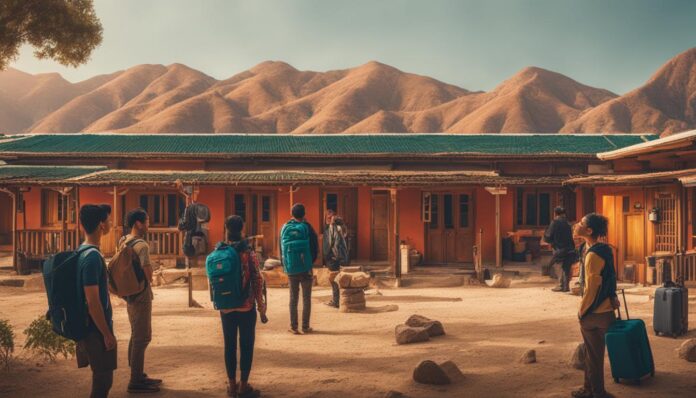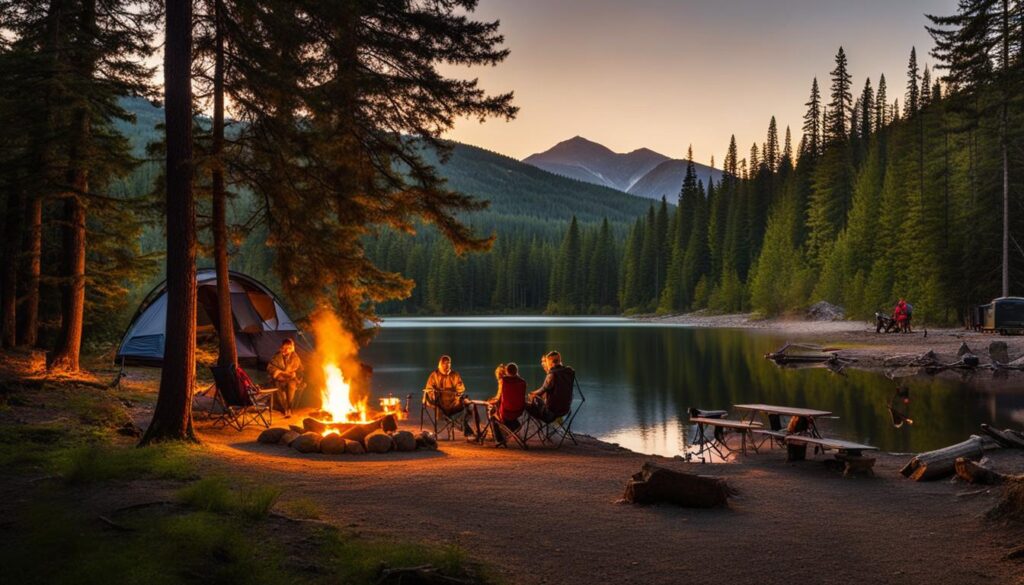When you plan a trip, one of the most important decisions to make is where to stay. With so many options available, it can be challenging to choose the right accommodation that will meet your needs and budget. In this article, we’ll discuss the pros and cons of different travel accommodations to help you make an informed decision. Knowing the advantages and disadvantages of various lodging options can help you select the best accommodation that suits your preferences and budget.
From luxury resorts to budget motels, we’ll cover everything in between. By the end of this article, you’ll have a clear understanding of the advantages and disadvantages of different travel accommodations, making it easier for you to decide what works best for you.
So, what are the pros and cons of different travel accommodations? Let’s explore each option in detail to understand the advantages and disadvantages of various lodging options.
Hotels
Hotels are the most common type of travel accommodation, with a wide range of options in every destination. They offer convenience, comfort, and a range of amenities that can make your trip stress-free and enjoyable. One of the main benefits of hotels is the level of service they provide. You can expect staff members to be available around the clock to assist you with anything from restaurant recommendations to arranging transportation.
Hotels also offer a range of room types and sizes to suit various needs and budgets. From standard rooms to luxury suites, you can choose the option that best fits your preferences and budget. Additionally, hotels often have on-site restaurants, fitness centers, and other amenities that can provide a convenient and comfortable stay.
| Benefits | Drawbacks |
|---|---|
| 24/7 service and assistance | Can be more expensive than other options |
| Range of room types and sizes | Less personalized than some other options |
| Various amenities available | May feel less authentic than other accommodations |
However, there are also some drawbacks to staying in hotels. They can be more expensive than other types of accommodations, especially in popular tourist destinations. Additionally, hotels can feel less personalized and authentic than some other lodging options, which can be a drawback for travelers looking for a unique experience.
In summary, hotels offer a convenient and comfortable travel accommodation with a range of amenities and services. However, they may be more expensive and less authentic than other options.
Vacation Rentals
If you’re looking for a more flexible and private accommodation, vacation rentals can be an excellent option. Vacation rentals are typically privately-owned properties that offer a home-like atmosphere for travelers.
Strengths: Vacation rentals provide more space and amenities than hotels. They are great for families or groups of friends traveling together, offering multiple rooms, kitchens, and living areas. Vacation rentals often have washers and dryers, which can be convenient for longer stays. Privacy is also a significant benefit, with most rentals offering exclusive access to the entire property.
Weaknesses: One of the biggest disadvantages of vacation rentals is that they can be more expensive than hotels, especially in popular tourist destinations. Additionally, vacation rentals may lack the services and easy access to tourist spots that hotels often provide. Some rentals may require a minimum stay, which can limit flexibility for travelers with changing plans.
Overall, vacation rentals can be an excellent option for travelers seeking privacy, space, and a home-like atmosphere. However, the price and lack of amenities may not be suitable for everyone’s needs.
Hostels
If you’re looking for budget-friendly travel accommodation, hostels may be a great option for you. Hostels offer affordable rates, making them ideal for travelers on a budget. However, there are both advantages and disadvantages to staying in a hostel.
Advantages of Hostels
- Hostels are budget-friendly and offer affordable rates for travelers.
- You have the opportunity to meet and socialize with other travelers, making it a great choice for solo travelers or those seeking a sense of community.
- Hostels often have communal spaces such as kitchens and lounges, providing a comfortable and convenient space to relax and socialize.
- Many hostels offer private rooms in addition to shared dormitories, giving travelers more flexibility and options.
Disadvantages of Hostels
- Shared bathrooms and dormitories may not be ideal for all travelers.
- Privacy can be limited, especially in shared dormitories, so it may not be the best option for couples or others seeking a secluded getaway.
- Noise levels can be high and sleep quality may be affected due to the communal nature of the living spaces.
- Security can be a concern, with shared lockers sometimes being the only option for storing valuables.
Overall, hostels are a great option for budget-conscious travelers who don’t mind sharing living spaces. To ensure a comfortable stay, research and book with reputable hostels, and be prepared to adapt to a communal living style if choosing this type of accommodation.
Bed and Breakfasts
Are you looking for a cozy and personalized travel accommodation option? Bed and breakfasts (B&Bs) might be just what you need. These small establishments typically offer comfortable rooms with private baths and homemade breakfasts.
One of the positive aspects of staying in a B&B is the unique experience it provides. Unlike larger chain hotels, B&Bs often have a distinctive charm and character that can vary from one place to another. Additionally, the proprietors of these establishments are often locals who can offer you insider tips on where to go and what to see in the area.
However, it’s important to note that there can be downsides to staying in a B&B. For example, some B&Bs may not have the amenities you might expect from a larger hotel, such as a gym or room service. Additionally, depending on the location and size of the establishment, some B&Bs may be more expensive than other lodging options.
Overall, if you’re looking for a unique and personalized travel experience that offers a cozy and inviting atmosphere, a B&B might be the way to go.
Campgrounds
Campgrounds provide a unique opportunity to immerse yourself in nature and enjoy the great outdoors during your travels. Unlike hotels or vacation rentals, campgrounds allow you to sleep under the stars, wake up to the sound of birds singing, and breathe in fresh air.
One of the benefits of staying in campgrounds is the lower cost compared to other types of accommodations. You can pitch a tent or park your RV for a fraction of the price of a hotel room or vacation rental. Additionally, many campgrounds offer amenities such as swimming pools, hiking trails, and communal areas for socializing.
Positives of staying in Campgrounds:
- Close to nature
- Lower cost compared to other accommodations
- Amenities available at many campgrounds
- Allows for a unique travel experience
However, there are also some drawbacks to staying in campgrounds. Sleeping in a tent or RV may not be as comfortable as a regular bed, and you have to take care of your own food, which might be challenging if you’re not an experienced camper. Additionally, some campgrounds may not have the same level of safety or security as other types of accommodations, especially in remote locations.
Negatives of staying in Campgrounds:
- Not as comfortable as a hotel or vacation rental
- Food preparation may be difficult
- Campgrounds may not have the same level of safety or security as other lodging options
If you love the outdoors and don’t mind roughing it a bit, staying in campgrounds can be a fantastic way to experience nature and save money on accommodations. Just be prepared for some potential discomfort and plan accordingly.
Resorts
If you’re looking for an all-inclusive travel experience, resorts might be the perfect accommodation option for you. Resorts are known for their luxurious amenities and services, which often include on-site spa treatments, multiple restaurants, and various recreational activities such as golfing, water sports, and fitness facilities. Resorts typically have a high level of customer service and a full-time staff dedicated to ensuring your stay is enjoyable and stress-free.
One of the main strengths of staying at a resort is the convenience that comes with having everything you need in one location. With the abundance of on-site amenities and activities, you never have to leave the resort if you don’t want to.
However, these luxuries can come at a high price. Resorts are often one of the most expensive lodging options, and the all-inclusive nature of the experience might not suit everyone’s travel style. If you prefer exploring local culture and food, a resort may not be the best fit for you. Additionally, booking a resort can be less flexible than other types of accommodation, with set check-in and check-out times and minimum stay requirements.
Overall, if you’re looking for a luxurious and hassle-free travel experience, resorts can be a great choice. However, if you’re prioritizing budget or cultural exploration, other types of lodging may be a better fit.
Vacation Timeshares
When it comes to travel accommodations, vacation timeshares offer a unique and customizable option for travelers. With a timeshare, you own a portion of a property and can use it for a set amount of time each year.
One of the advantages of a timeshare is the ability to have a consistent vacation spot that feels like a home away from home. You can customize the space to your liking and enjoy the familiarity of returning to the same location each year.
However, there are also potential drawbacks to consider. Timeshares can be expensive upfront investments, and you may feel locked into using the same property for your vacation each year. Additionally, maintenance fees and other associated costs can add up over time.
If you’re considering a timeshare as your travel accommodation option, it’s important to do your research, carefully weigh the benefits and drawbacks, and make an informed decision that works for your budget and travel preferences.
Motels
If you’re looking for a budget-friendly and convenient travel accommodation option, motels are an excellent choice. With easy access to major highways and attractions, motels are often located in convenient locations that allow you to easily explore the area.
One of the biggest advantages of staying in a motel is that they are often more affordable than hotels, making them a great option if you’re trying to save money on your trip. In addition, many motels offer basic amenities such as free Wi-Fi, parking, and breakfast, which can help you save even more money on your trip.
However, there are also some negative aspects to staying in motels. While they are often clean and well-maintained, they may not have the same level of luxury or comfort as hotels or other types of accommodations. In addition, motels may not provide the same level of security as hotels, which can be a concern for some travelers.
Overall, motels are a great option for travelers who are on a budget and looking for a convenient place to stay. Whether you’re taking a road trip or just need a place to stay for the night, motels can provide everything you need for a comfortable stay.
Homestays
If you’re looking for a culturally immersive travel experience, homestays can be a great option. By staying with a local family, you’ll get a unique opportunity to learn about the local culture and way of life. Plus, you’ll often have access to home-cooked meals and insider knowledge about the best things to see and do in the area.
| Pluses | Minuses |
|---|---|
|
|
As with any type of travel accommodations, there are both strengths and weaknesses to consider when choosing homestays. While the cultural immersion can be a valuable experience, it’s important to keep in mind that you may have less privacy and may not have the same level of independence as you would in a hotel or vacation rental. Additionally, communication barriers or cultural differences could present challenges.
Conclusion
After exploring the pros and cons of different travel accommodations, you now have a better understanding of the advantages and disadvantages of various lodging options. Hotels offer comfort and convenience, but they can be costly. Vacation rentals are spacious and provide more privacy, but they lack the amenities of a hotel. Hostels are budget-friendly, but they may not offer the upmarket experience you desire.
Bed and breakfasts provide a cozy and personalized experience, but they may be too intimate for some travelers. Campgrounds offer an outdoor and nature-oriented experience, but they lack the comfort of indoor accommodations. Resorts offer luxury and all-inclusive experiences, but they can be expensive.
Vacation timeshares allow for unique and flexible accommodations, but they can be difficult to resell. Motels are budget-friendly and convenient, but they may not offer the level of comfort you desire. Homestays provide a culturally immersive experience, but they may not provide the privacy and amenities of other accommodations.
When choosing your lodging for the next trip, consider the pros and cons of each option and which accommodations will best suit your needs and budget. With the knowledge gained from this article, you can make an informed decision and enjoy a comfortable and convenient stay.

















































